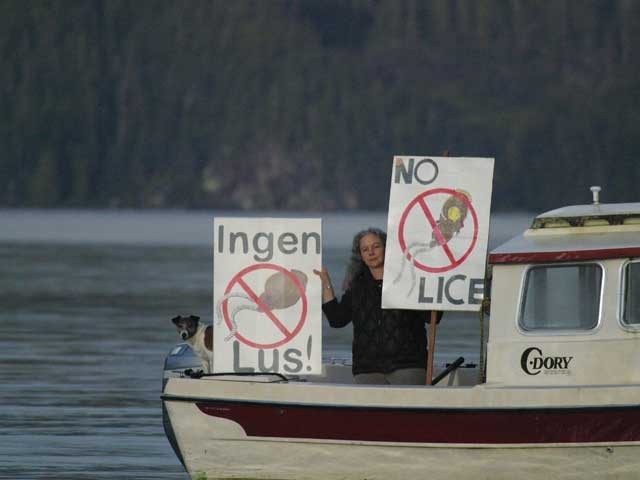Local environmentalists reveled in a Supreme Court of British Columbia ruling this week that could wipe out the province's fish farming industry.
"The only thing I can say and know for now is that obviously the farms as they stand right now are no longer legal," said Ana Santos, a Squamish-based researcher who railed against fish farming during the Brackendale Eagle Festival.
"They have to stop operating as they are. No more leases will be granted. No more licenses will be given, and the ones who requested more space and expansion will not be able to have it."
The ruling comes after a long and arduous campaign mounted by Alexandra Morton, a prominent environmental activist who last month presented her case to audiences at the Brackendale Art Gallery. The decision will see the province turn jurisdiction over the farms to the federal government within a year. Until now, the province was allowed to oversee the farms without being responsible for the mess, a situation the court called unconstitutional. Traditionally, the Department of Fisheries and Oceans answers to ocean-based activity.
"Finally, the government agency in charge of fish farms is mandated to put wild salmon first," said Morton in a press release. "This has come none too soon as provincial management of fish farms is devastating many coastal communities.
"Because the province is not responsible for the oceans, the impact of fish farms on the oceans became nobody's business and this is how we got into this mess."
The ruling was announced Monday afternoon, and a volley of celebratory e-mails circulated throughout the ranks of Squamish's environmental community. Just the same, praise was conditional.
"I'm a little disappointed that it'll take a year to come into effect," said Jack Cooley of Squamish Streamkeepers. "I don't know how necessary it is for it to be that long. They have 12 months to change the jurisdiction from federal to provincial. That's too long a time as far as I'm concerned. Maybe six months."
There's also the possibility of an appeal, an option the B.C. Ministry of Agriculture and Land can explore within the next month.
"They have 30 days to appeal, and they probably won't," said Catherine Jackson, president of the Squamish Environmental Conservation Society. "The public is against it, and an election is coming."
Salmon farming took centre stage in Squamish this winter. Numbers from the annual Brackendale eagle count were abysmal, and organizers fingered fish farming for the decline. Fish-bearing rivers attract eagles, and farming diminishes chum counts because of surfeit sea lice the practice fosters. A low chum count attracts fewer eagles.
"Really, it's got to get better from day one," said Santos of the ruling's local impact. "(Farmers) have to be making changes and adjustments, and the changes are going to be so big that they'll stop operating as they have been up to now. And the next generation of salmon will be better. The effect of the lice is so immediate that if they stop what they're doing immediately then the salmon come back immediately. For the whole coast, it's great news."




